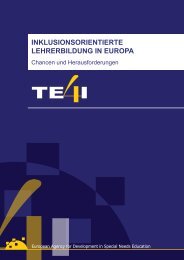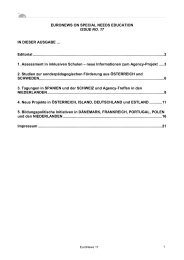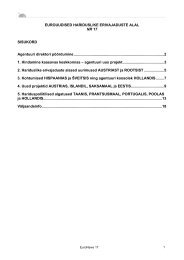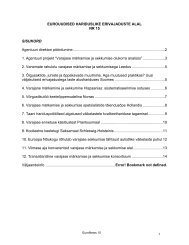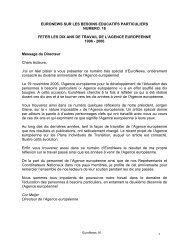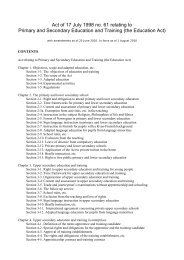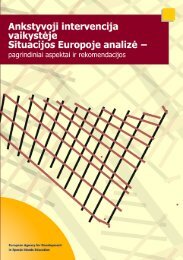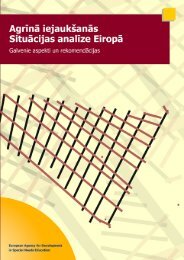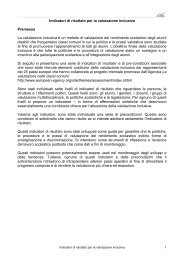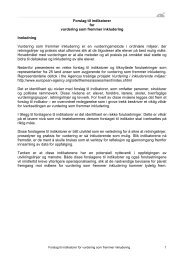Conclusiones de la Conferencia Internacional - European Agency ...
Conclusiones de la Conferencia Internacional - European Agency ...
Conclusiones de la Conferencia Internacional - European Agency ...
Create successful ePaper yourself
Turn your PDF publications into a flip-book with our unique Google optimized e-Paper software.
CONCLUSIONES DE LA<br />
CONFERENCIA INTERNACIONAL<br />
“LA EDUCACIÓN INCLUSIVA:<br />
VÍA PARA FAVORECER LA COHESIÓN SOCIAL”<br />
Madrid, 11 y 12 <strong>de</strong> marzo <strong>de</strong> 2010<br />
CONCLUSIONS OF THE<br />
INTERNATIONAL CONFERENCE:<br />
‘Inclusive Education:<br />
A way to promote Social Cohesion’<br />
11–12 March 2010, Madrid
MINISTERIO<br />
DE EDUCACIÓN<br />
CONCLUSIONES<br />
DE LA CONFERENCIA INTERNACIONAL<br />
“LA EDUCACIÓN INCLUSIVA:<br />
VÍA PARA FAVORECER LA COHESIÓN SOCIAL”<br />
Madrid, 11 y 12 <strong>de</strong> marzo <strong>de</strong> 2010<br />
La educación inclusiva, como <strong>de</strong>recho universal, requiere <strong>de</strong> políticas ten<strong>de</strong>ntes a<br />
que todos los ciudadanos reciban una educación <strong>de</strong> calidad, con equidad y<br />
excelencia, así como disponer <strong>de</strong> los recursos necesarios (económicos, humanos,<br />
didácticos, técnicos y tecnológicos) para que los centros ofrezcan respuestas que<br />
conduzcan al éxito <strong>de</strong> todo el alumnado, con in<strong>de</strong>pen<strong>de</strong>ncia <strong>de</strong> sus condiciones<br />
personales, sociales, económicas, culturales, geográficas, étnicas o <strong>de</strong> otra índole.<br />
Especial mención requiere el género atendiendo a <strong>la</strong> discriminación específica que<br />
sufren <strong>la</strong>s niñas y <strong>la</strong>s mujeres con discapacidad.<br />
Se <strong>de</strong>be asegurar <strong>la</strong> educación inclusiva con calidad, equidad y excelencia,<br />
haciendo efectivos los principios <strong>de</strong> igualdad <strong>de</strong> oportunida<strong>de</strong>s, no discriminación<br />
y accesibilidad universal. Todos ellos son principios complementarios e<br />
inseparables.<br />
Esta <strong>Conferencia</strong>, a <strong>la</strong> que han asistido representantes <strong>de</strong> <strong>la</strong>s Comunida<strong>de</strong>s<br />
Autónoma españo<strong>la</strong>s, <strong>de</strong> los países europeos, <strong>de</strong> Iberoamérica y <strong>de</strong> <strong>la</strong> sociedad<br />
civil, preten<strong>de</strong> respon<strong>de</strong>r a uno <strong>de</strong> los cuatro objetivos <strong>de</strong> <strong>la</strong> Presi<strong>de</strong>ncia españo<strong>la</strong><br />
en el ámbito educativo, <strong>de</strong>be incidir en <strong>la</strong>s políticas educativas que promueven <strong>la</strong><br />
equidad, <strong>la</strong> cohesión social y <strong>la</strong> ciudadanía activa, es <strong>de</strong>cir, dar respuesta a los<br />
retos p<strong>la</strong>nteados: abandonos esco<strong>la</strong>res prematuros, alumnos con necesida<strong>de</strong>s <strong>de</strong><br />
apoyo educativo y <strong>de</strong> compensación.<br />
Se han realizado gran<strong>de</strong>s avances en educación, tanto en el terreno conceptual,<br />
como en el legis<strong>la</strong>tivo y en <strong>la</strong> aplicación práctica, que van conduciendo hacia el<br />
logro <strong>de</strong> una educación inclusiva. Destaca <strong>la</strong> adopción <strong>de</strong> <strong>la</strong> Convención <strong>de</strong><br />
Naciones Unidas sobre los Derechos <strong>de</strong> <strong>la</strong>s Personas con Discapacidad, y <strong>de</strong><br />
manera especial el Artículo 24 sobre educación.<br />
No obstante, <strong>la</strong> educación inclusiva sigue siendo una meta a conseguir.<br />
Es necesario superar importantes retos hasta alcanzar los objetivos <strong>de</strong>seados <strong>de</strong><br />
calidad, equidad, inclusión, respeto a <strong>la</strong> diversidad y participación real <strong>de</strong> todas <strong>la</strong>s
MINISTERIO<br />
DE EDUCACIÓN<br />
personas en <strong>la</strong> sociedad.<br />
La <strong>Conferencia</strong> ha prestado especial atención, tanto a los avances como a los<br />
retos, sobre todo en <strong>la</strong> enseñanza secundaria, <strong>la</strong> formación profesional y <strong>la</strong><br />
educación superior.<br />
Entre todas <strong>la</strong>s propuestas recogidas, cabe <strong>de</strong>stacar <strong>la</strong>s<br />
siguientes:<br />
La educación inclusiva, centrada en <strong>la</strong> persona, beneficia a todos los<br />
estudiantes, ya sean con necesida<strong>de</strong>s específicas <strong>de</strong> apoyo educativo<br />
<strong>de</strong>rivadas <strong>de</strong> discapacidad o <strong>de</strong> otra circunstancia, ya que les prepara para<br />
vivir y trabajar en una sociedad plural.<br />
Hace falta voluntad política y <strong>de</strong>terminación <strong>de</strong> todas <strong>la</strong>s partes implicadas<br />
para promover cambios profundos y sistemáticos, es <strong>de</strong>cir, aportar visión,<br />
conocimientos, competencias y marco legal para hacer realidad una<br />
educación inclusiva <strong>de</strong> calidad con equidad y excelencia en entornos<br />
ordinarios en todas <strong>la</strong>s enseñanzas <strong>de</strong>l sistema educativo. La sociedad en<br />
su totalidad tiene que implicarse y participar en este cambio educativo.<br />
Apoyar políticas coordinadas intersectoriales y promocionar el intercambio<br />
<strong>de</strong> buenas prácticas.<br />
Es necesario establecer sistemas <strong>de</strong> recogida y análisis <strong>de</strong> información que<br />
permitan hacer un seguimiento <strong>de</strong> <strong>la</strong>s políticas y buenas prácticas<br />
inclusivas con indicadores que permitan i<strong>de</strong>ntificar los factores que generan<br />
exclusión y los que favorecen <strong>la</strong> inclusión.<br />
Apoyar <strong>la</strong> trasformación <strong>de</strong> los centros para avanzar hacia <strong>la</strong> realización <strong>de</strong>l<br />
<strong>de</strong>recho a <strong>la</strong> educación para todas y todos. Ello requiere sistemas<br />
educativos flexibles, respetar <strong>la</strong> diversidad como un valor, eliminar todo tipo<br />
<strong>de</strong> barreras (físicas, <strong>de</strong> acceso al currículo, actitudinales, tecnológicas, <strong>de</strong><br />
socialización y <strong>de</strong> comunicación, facilitando el aprendizaje y uso <strong>de</strong> <strong>la</strong><br />
lengua <strong>de</strong> signos y <strong>de</strong> los medios <strong>de</strong> apoyo a <strong>la</strong> comunicación oral),<br />
proporcionar apoyos tanto a los centros como a los docentes, fomentar el<br />
trabajo en equipo <strong>de</strong> los profesionales <strong>de</strong> los centros, potenciar el li<strong>de</strong>razgo<br />
<strong>de</strong> los equipo directivos, favorecer <strong>la</strong>s condiciones <strong>de</strong> convivencia y<br />
promover <strong>la</strong> co<strong>la</strong>boración entre alumnos, padres, profesores y sociedad<br />
civil.
MINISTERIO<br />
DE EDUCACIÓN<br />
Es necesario facilitar el tránsito entre <strong>la</strong>s diferentes etapas educativas y el<br />
<strong>de</strong> éstas al mundo <strong>la</strong>boral. Facilitar educación inclusiva <strong>de</strong>s<strong>de</strong> el inicio <strong>de</strong> <strong>la</strong><br />
esco<strong>la</strong>ridad, privilegiando <strong>la</strong> <strong>de</strong>tección y atención temprana.<br />
Es necesario <strong>la</strong> presión y el apoyo <strong>de</strong> <strong>la</strong> sociedad civil para impulsar los<br />
cambios necesarios.<br />
La formación inicial y permanente <strong>de</strong>l profesorado <strong>de</strong> todos los niveles<br />
educativos para aten<strong>de</strong>r a <strong>la</strong> diversidad <strong>de</strong> necesida<strong>de</strong>s <strong>de</strong>l alumnado y<br />
<strong>de</strong>sempeñar a<strong>de</strong>cuadamente su tarea en el marco <strong>de</strong> <strong>la</strong> educación inclusiva<br />
es un factor c<strong>la</strong>ve para llevar ésta a cabo.<br />
Los jóvenes no quieren ser tratados como niños o niñas, quieren tomar sus<br />
propias <strong>de</strong>cisiones. Todos los jóvenes tienen <strong>de</strong>recho a acce<strong>de</strong>r a<br />
programas <strong>de</strong> estudio que les preparen para ser ciudadanos <strong>de</strong> pleno<br />
<strong>de</strong>recho.<br />
Uno <strong>de</strong> los factores esenciales para el éxito <strong>de</strong> <strong>la</strong> formación profesional es<br />
<strong>la</strong> vincu<strong>la</strong>ción con el mundo <strong>la</strong>boral, así como po<strong>de</strong>r realizar prácticas en el<br />
mismo.<br />
La inclusión en <strong>la</strong> educación superior se consi<strong>de</strong>ra igual <strong>de</strong> necesaria que<br />
en los otros niveles educativos. Es necesario facilitar el acceso a <strong>la</strong><br />
Universidad para que exista una mayor presencia <strong>de</strong>l alumnado que<br />
presenta discapacidad o se encuentra en situción <strong>de</strong>sfavorable <strong>de</strong>rivada <strong>de</strong><br />
cualquier factor, así como contar con los servicios <strong>de</strong> apoyo especializados<br />
que actúen como intermediarios entre los alumnos y sus tutores.<br />
Las medidas que se adoptan en <strong>la</strong> práctica educativa inclusiva benefician a<br />
todo el alumnado.
Trans<strong>la</strong>tion:<br />
CONCLUSIONS OF THE INTERNATIONAL CONFERENCE:<br />
‘Inclusive Education: A way to promote Social Cohesion’<br />
11–12 March 2010, Madrid<br />
Inclusive education is a universal right. It requires policy measures that aim to provi<strong>de</strong> an<br />
education of quality, equity and excellence to all citizens. It also implies that all required<br />
resources (financial, human, educational, technical and technological) will be provi<strong>de</strong>d to<br />
all educational centres, to enable them to respond to and secure the educational success<br />
of all learners, whatever their personal, economic, social, cultural, geographic or ethnic<br />
background. Special attention should be paid to gen<strong>de</strong>r, taking into account the specific<br />
discrimination suffered by girls and women with disabilities.<br />
Inclusive education needs to ensure quality, equity and excellence, according to principles<br />
such as equal opportunities, non-discrimination and universal access. All these principles<br />
are complementary and inseparable.<br />
This Conference, which has involved representatives from the different Autonomous<br />
Communities in Spain, from <strong>European</strong> countries, from Latin America and from voluntary<br />
sector, is in accordance with one of the four objectives of the Spanish Presi<strong>de</strong>ncy in the<br />
field of education: to have an impact on educational policies promoting equity, social<br />
cohesion and active citizenship. This objective seeks to respond to different challenges:<br />
early school leaving and learners with a need for any additional educational support.<br />
Important progress has been ma<strong>de</strong> in education at theoretical, policy and practical levels<br />
that will support the move towards inclusive education. In particu<strong>la</strong>r, mention needs to be<br />
ma<strong>de</strong> of the adoption of the United Nations Convention on the Rights of People with<br />
Disabilities, especially Article 24 on education.<br />
Nevertheless, inclusive education is still an aim to be achieved.<br />
Important challenges need to be overcome in or<strong>de</strong>r to achieve the expected objectives of<br />
quality, equity, inclusion, respect for diversity and effective participation in society for all.<br />
The Conference paid special attention to progress as well as challenges at three<br />
educational levels: secondary, vocational and higher education.<br />
The following proposals raised at the conference need to be highlighted:<br />
• Inclusive education, that p<strong>la</strong>ces the person at the centre, is beneficial for all<br />
learners with or without special needs due to disability or any other circumstance.<br />
Inclusive education will prepare learners to live and work in a plural society.<br />
• Political will and <strong>de</strong>termination from all partners involved is nee<strong>de</strong>d to promote<br />
profound systemic changes. This requires the vision, the knowledge, the skills and<br />
the legal framework to be brought together in or<strong>de</strong>r to implement an inclusive<br />
education of quality with equity and excellence in mainstream settings at all levels<br />
of education. The entire society needs to be involved and participate in this<br />
educational change.<br />
• There is a need to support co-ordinated policies among all sectors involved as well<br />
as to support the exchange of good practices.
• There is a need to set up a<strong>de</strong>quate mechanisms to collect and analyse the required<br />
information in or<strong>de</strong>r to monitor policies as well as good practices through indicators.<br />
These indicators will allow the factors that contribute to exclusion and those that<br />
facilitate inclusion to be i<strong>de</strong>ntified.<br />
• To support change in educational settings and progress towards implementing the<br />
right to education for all, the following are required: flexible educational systems;<br />
diversity seen as a value; elimination of all barriers (physical, study programmes<br />
and materials, attitu<strong>de</strong>s, equipment and specialist aids, social activities,<br />
communication, access to sign <strong>la</strong>nguage and other tools to improve oral<br />
communication); support to teachers and schools; team work; lea<strong>de</strong>rship in<br />
schools; harmonious conditions among learners; and co-operation between<br />
parents, professionals and voluntary sector.<br />
• There is a need to: facilitate the transition between different levels of education and<br />
the move into employment; to facilitate inclusive education from the beginning of<br />
schooling and p<strong>la</strong>ce special emphasis on early i<strong>de</strong>ntification and intervention.<br />
• Particu<strong>la</strong>r attention needs to be paid to teachers’ education (initial and in-service<br />
training) at all levels of education. Teachers’ education needs to prepare them to<br />
respond to the diverse needs of learners and this is a key factor for the success of<br />
inclusive education.<br />
• Young people do not want to be treated like children; they want to be able to make<br />
their own <strong>de</strong>cisions. They all have the right to access a curriculum that will prepare<br />
them to become full citizens.<br />
• One of the key factors regarding vocational education re<strong>la</strong>tes to the need to build a<br />
close re<strong>la</strong>tionship between training and the open <strong>la</strong>bour market as well as to<br />
provi<strong>de</strong> practical training in enterprise.<br />
• Inclusion within higher education needs to be seen as a priority as it is within the<br />
compulsory education system. Access to higher education needs to be improved in<br />
or<strong>de</strong>r increase the representation of stu<strong>de</strong>nts with disabilities and those from<br />
vulnerable groups. Support services are nee<strong>de</strong>d, in particu<strong>la</strong>r from professionals<br />
acting as ‘intermediaries’ between the stu<strong>de</strong>nts and their tutors.<br />
• Finally, all measures implemented in the frame of inclusive education will be of<br />
benefit for all learners.



